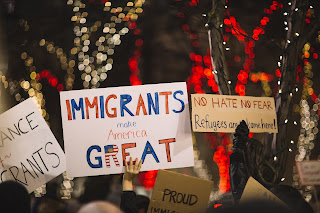Immigration policy has long been a cornerstone of American politics, shaping the nation's cultural, economic, and social landscape. From the earliest waves of settlers to the ongoing debates surrounding border security, immigration has been a topic of intense discussion and policy development. This blog post delves into the multifaceted relationship between immigration policy and American politics, exploring its historical roots, its influence on political ideologies, and its impact on various aspects of society.
Historical Context
The United States' history is intertwined with immigration. The country was founded by European settlers seeking religious freedom and economic opportunities. The first immigration laws were introduced in the late 19th and early 20th centuries to regulate the influx of newcomers, with the Chinese Exclusion Act of 1882 being a notable example. These laws were often driven by economic concerns and nativist sentiments, reflecting tensions between existing citizens and new arrivals.
Political Ideologies and Immigration
Immigration policy has consistently been a focal point for political ideologies. Conservatives tend to emphasize national security and the preservation of cultural identity, advocating for stricter border controls and limited immigration. On the other hand, liberals often emphasize human rights, diversity, and economic benefits, advocating for more inclusive and comprehensive immigration policies.
In recent decades, the divide between these ideologies has led to contentious debates in Congress, resulting in immigration reform efforts such as the 1986 Immigration Reform and Control Act and the proposed DREAM Act. These debates highlight the complexities of balancing economic interests, human rights, and national security concerns.
Economic Impact
Immigration plays a pivotal role in the American economy. Immigrants contribute to economic growth by filling labor gaps in various sectors, from agriculture to technology. Highly skilled immigrants, in particular, have been instrumental in driving innovation and boosting industries like healthcare, engineering, and information technology. Additionally, immigrant entrepreneurs have founded numerous successful startups, creating jobs and fostering economic dynamism.
However, the economic impact of immigration is a double-edged sword. Critics argue that immigrants can put pressure on job markets and social welfare systems, leading to concerns about wage suppression and increased competition for limited resources. Balancing these economic benefits and challenges is a central consideration in shaping immigration policy.
Social and Cultural Implications
Immigration policy is deeply intertwined with the social fabric of American society. Newcomers bring with them diverse languages, religions, and traditions that enrich the cultural landscape. The "melting pot" analogy, which envisions a fusion of different cultures into a unified American identity, has been central to the nation's self-perception.
However, challenges related to assimilation, cultural tension, and social cohesion have also arisen. These challenges have led to debates over the role of bilingual education, the celebration of cultural diversity, and the preservation of national identity. Striking a balance between fostering a diverse society and maintaining a sense of unity is an ongoing endeavor.
National Security and Border Control
The issue of national security has been a driving force behind immigration policy. Concerns about unauthorized immigration, human trafficking, and terrorism have led to the implementation of stricter border control measures. The creation of agencies like the Department of Homeland Security and Immigration and Customs Enforcement (ICE) reflects the government's commitment to ensuring national security.
However, these efforts have sparked controversies surrounding the treatment of migrants, the separation of families, and the conditions of detention centers. The tension between safeguarding national security and upholding humanitarian values is at the heart of the immigration policy discourse.
The Role of Public Opinion
Public opinion plays a crucial role in shaping immigration policy. Throughout history, shifts in public sentiment have influenced the direction of immigration legislation. Public perceptions of immigrants as economic contributors or potential burdens can sway policy decisions. Media coverage, political discourse, and social movements also shape public opinion, amplifying the impact of immigration policy on political agendas.
Immigration policy is a dynamic and multifaceted issue that continues to shape American politics in profound ways. Its historical roots, influence on political ideologies, economic implications, social and cultural impact, national security concerns, and the role of public opinion all contribute to its complexity. As the United States grapples with these complexities, finding a balance between economic growth, human rights, and national interests remains a defining challenge. Through comprehensive analysis and thoughtful consideration, a more nuanced and effective immigration policy can be developed to navigate the intricate intersection of immigration and American politics.




.jpg)


No comments:
Post a Comment